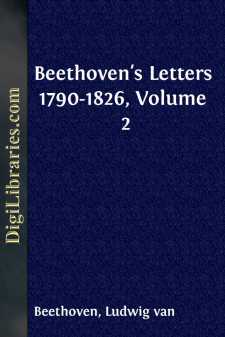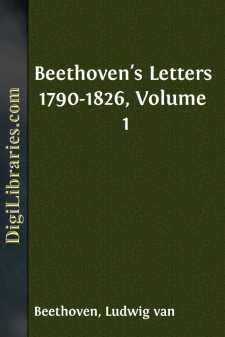Categories
- Antiques & Collectibles 13
- Architecture 36
- Art 48
- Bibles 22
- Biography & Autobiography 813
- Body, Mind & Spirit 142
- Business & Economics 28
- Children's Books 15
- Children's Fiction 12
- Computers 4
- Cooking 94
- Crafts & Hobbies 4
- Drama 346
- Education 46
- Family & Relationships 57
- Fiction 11828
- Games 19
- Gardening 17
- Health & Fitness 34
- History 1377
- House & Home 1
- Humor 147
- Juvenile Fiction 1873
- Juvenile Nonfiction 202
- Language Arts & Disciplines 88
- Law 16
- Literary Collections 686
- Literary Criticism 179
- Mathematics 13
- Medical 41
- Music 40
- Nature 179
- Non-Classifiable 1768
- Performing Arts 7
- Periodicals 1453
- Philosophy 64
- Photography 2
- Poetry 896
- Political Science 203
- Psychology 42
- Reference 154
- Religion 513
- Science 126
- Self-Help 84
- Social Science 81
- Sports & Recreation 34
- Study Aids 3
- Technology & Engineering 59
- Transportation 23
- Travel 463
- True Crime 29
Ludwig van Beethoven
Ludwig van Beethoven was a German composer and pianist, widely regarded as one of the greatest composers in Western music history. He bridged the transition between the Classical and Romantic eras, creating symphonies, concertos, sonatas, and chamber music that are still celebrated today. Despite losing his hearing in his late 20s, he continued to compose masterpieces like "Symphony No. 9" and "Fidelio." His compositions broke new ground in terms of emotional depth, structure, and complexity, influencing countless future musicians and composers.
Author's Books:
Sort by:
BEETHOVEN'S LETTERS. 216.TO STEINER & CO. The Adjutant's innocence is admitted, and there is an end of it! We beg you to be so good as to send us two copies in score of the Symphony in A. We likewise wish to know when we may expect a copy of the Sonata for Baroness von Ertmann, as she leaves this, most probably, the day after to-morrow. No. 3--I mean the enclosed note--is from a musical...
more...
BRIEF BIOGRAPHICAL SKETCH Ludwig van Beethoven (1770-1827) is widely considered to be one of the pre-eminent classical music figures of the Western world. This German musical genius created numerous works that are firmly entrenched in the repertoire. Except for a weakness in composing vocal and operatic music (to which he himself admitted, notwithstanding a few vocal works like the opera...
more...
THE LIFE OF HEINRICH HEINE BY WILLIAM GUILD HOWARD, A.M.Assistant Professor of German, Harvard University I. The history of German literature makes mention of few men more self-centered and at the same time more unreserved than Heinrich Heine. It may be said that everything which Heine wrote gives us, and was intended to give us, first of all some new impression of the writer; so that after a perusal...
more...
FIRST PART. LIFE'S JOYS AND SORROWS.1783 TO 1815. 1.TO THE ELECTOR OF COLOGNE, FREDERICK MAXIMILIAN. ILLUSTRIOUS PRINCE,-- Music from my fourth year has ever been my favorite pursuit. Thus early introduced to the sweet Muse, who attuned my soul to pure harmony, I loved her, and sometimes ventured to think that I was beloved by her in return. I have now attained my eleventh year, and my Muse often...
more...





